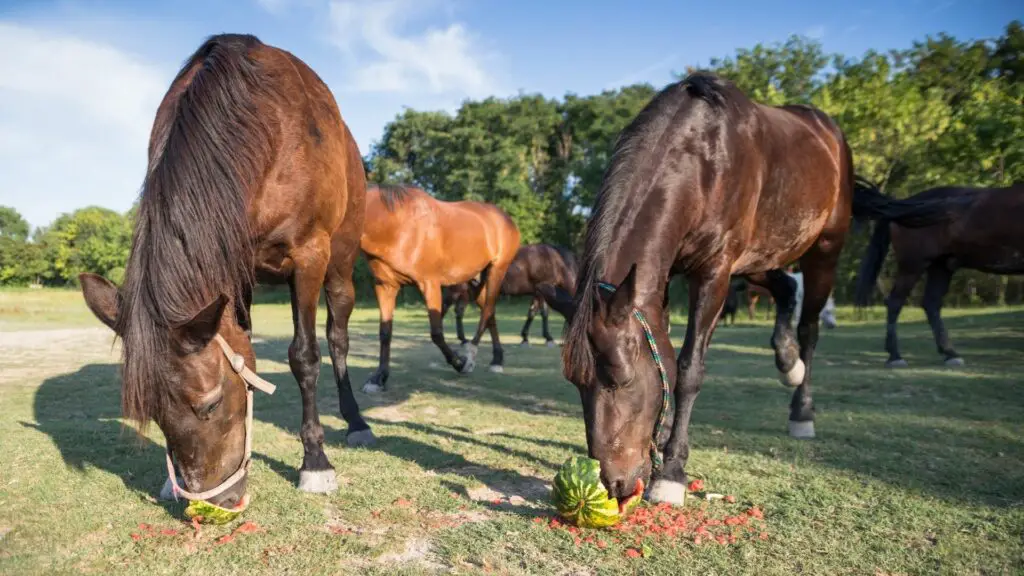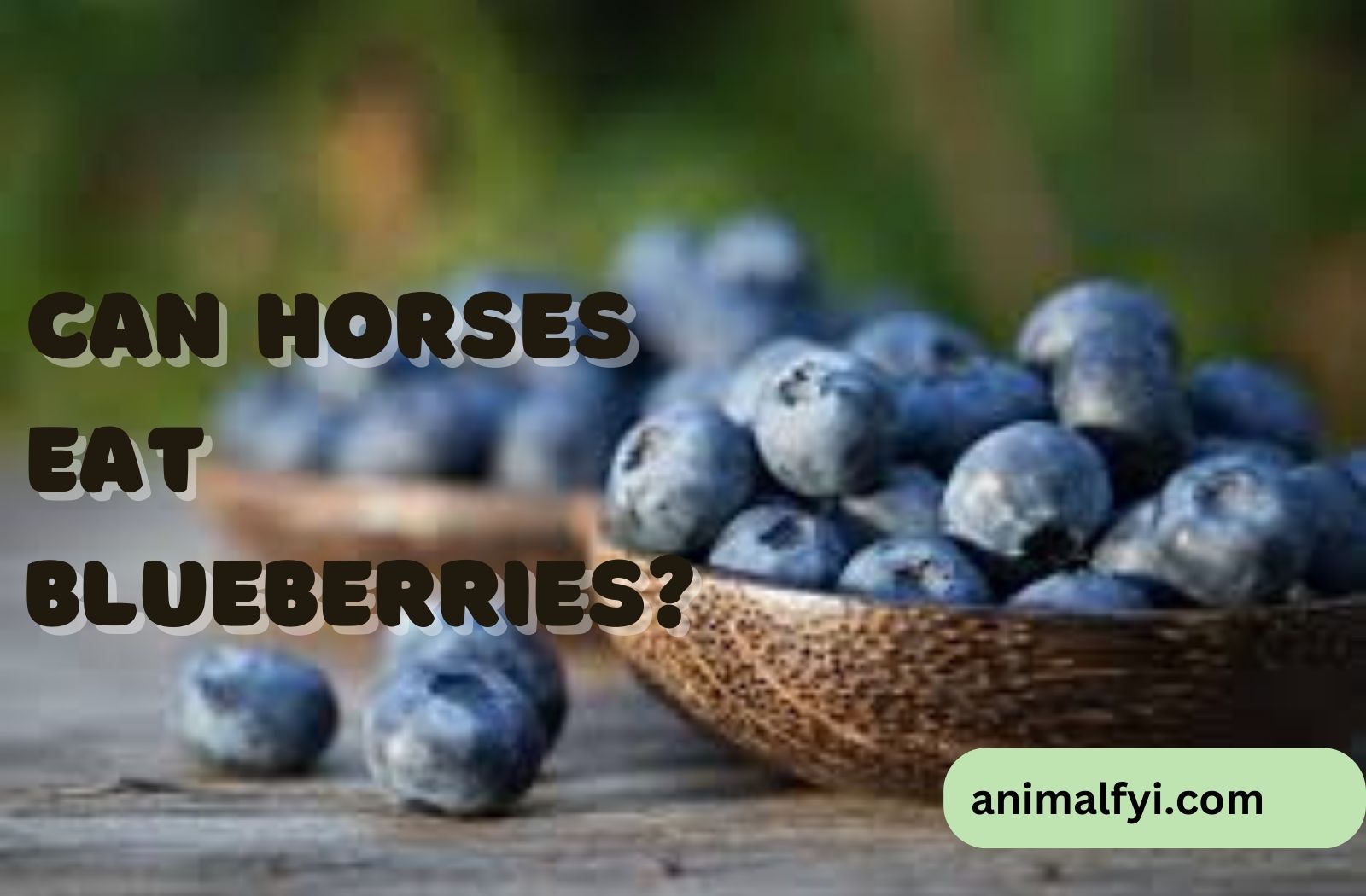When it comes to treating our equine companions, it’s essential to consider their dietary needs. Many horse owners wonder if blueberries can be a part of their horse’s diet. Blueberries are known for their health benefits and delicious taste, but can horses eat blueberries? In this comprehensive guide, we will explore the suitability of blueberries as a treat for horses. From understanding their nutritional profile to considering the potential benefits and precautions, you’ll gain valuable insights to make an informed decision about offering blueberries to your beloved horse.
Understanding Horses’ Digestive System
Horses are herbivores with a unique digestive system designed for a high-fiber diet. Their digestive tract consists of the mouth, esophagus, stomach, small intestine, large intestine, and cecum. The equine digestive system is optimized to process and extract nutrients from plant materials. Horses rely on a well-balanced diet to meet their nutritional requirements, including essential vitamins, minerals, protein, and fiber.
Blueberries: Nutritional Profile and Benefits
Blueberries are a nutritious fruit packed with antioxidants, vitamins, and fiber. They are a rich source of vitamin C, vitamin K, and manganese. Antioxidants found in blueberries can help combat free radicals, potentially benefiting the horse’s overall health. The low-calorie content of blueberries makes them an attractive treat option for horses who require weight management.
While horses can enjoy the nutritional benefits of blueberries, it’s important to remember that they should be fed in moderation as treats and not as a significant portion of their diet. Blueberries should not replace a balanced equine diet but can be a healthy addition when offered as occasional treats.
Factors to Consider
When feeding blueberries to horses, several factors should be considered. Moderation is key, as excessive consumption can lead to digestive upset or nutrient imbalances. Blueberries should be offered as a supplement to a well-balanced diet and not in place of essential equine nutrition.
Additionally, safety concerns should be addressed. Blueberries are small and can pose a choking hazard, especially if fed whole. It’s recommended to cut or mash blueberries before offering them to horses to minimize the risk of choking.
Can Horses Eat Blueberries?
Yes, horses can eat blueberries! Blueberries can be a healthy treat option for horses when fed in moderation. They can be offered as a reward during training or as a special treat on occasion. It’s important to introduce blueberries gradually into the horse’s diet to monitor their response and prevent any adverse reactions. Start with a small amount and observe the horse’s digestion and overall well-being.
Alternative Treats for Horses
While blueberries are a nutritious treat option, there are other fruits and vegetables that horses can enjoy. Carrots, apples, and watermelon are popular choices that can provide variety and additional nutritional benefits. It’s important to consider the horse’s preferences and dietary needs when offering treats. Always ensure that any treats provided are safe, fresh, and free from pesticides or harmful additives.
Precautions and Considerations
Consulting with a veterinarian or equine nutritionist is crucial when making decisions about treats for your horse. They can provide personalized recommendations based on your horse’s individual dietary requirements, health conditions, and specific needs. Regular monitoring of the horse’s overall health, weight, and digestion is essential to ensure that treats, including blueberries, are not negatively impacting their well-being.
Are horses allowed blueberries?
Yes, horses are generally allowed to eat blueberries as a treat. Blueberries can provide horses with additional nutritional benefits and can be a tasty and healthy reward when fed in moderation. However, it’s important to introduce blueberries gradually into a horse’s diet and monitor their response. Some horses may have individual sensitivities or allergies to certain foods, so it’s always wise to observe any signs of digestive upset or adverse reactions when introducing a new treat like blueberries.
Are berries safe for horses?
Yes, berries, including blueberries, can be safe for horses when offered as a treat in appropriate portions. However, it’s crucial to choose the right types of berries and feed them in moderation. Blueberries, strawberries, raspberries, and blackberries are generally safe for horses to consume. These berries are low in sugar and can provide antioxidants, vitamins, and fiber. It’s important to remember that treats should not replace a balanced equine diet, and berries should be offered as occasional rewards rather than a significant portion of the horse’s daily food intake.
What animal cannot eat blueberries?
While many animals can consume blueberries, there is one animal that should avoid them due to potential toxicity: dogs. Blueberries are safe and beneficial for horses, humans, and other animals, but they can be toxic to dogs in large quantities. Blueberries are not toxic to dogs in small amounts, but it’s always best to consult with a veterinarian before introducing any new food to a dog’s diet. It’s important to note that each species has unique digestive systems and dietary requirements, so what may be safe for one animal may not necessarily be safe for another.
Is there any fruit that horses can’t eat?

While horses can consume a variety of fruits, there are certain fruits that should be avoided due to their potential toxicity or negative effects on equine health. Some fruits that horses should not eat include:
- Avocado: Avocado contains a compound called persin, which can be toxic to horses and may cause gastrointestinal distress.
- Cherries: Cherry pits and stems contain cyanide, which can be harmful to horses if ingested in large quantities. It’s best to remove pits and stems before offering cherries to horses.
- Citrus Fruits: Citrus fruits such as oranges, lemons, and grapefruits are not toxic to horses, but their high acidity can cause digestive upset or mouth sores in some individuals. It’s advisable to feed citrus fruits in small quantities or avoid them altogether.
- Stone Fruits: Stone fruits like peaches, plums, and apricots contain pits that can be a choking hazard for horses. Additionally, the pits contain small amounts of cyanide, although the risk of toxicity from consuming these pits is generally low.
It’s always important to research and consult with a veterinarian or equine nutritionist before introducing new fruits or any other food into a horse’s diet. Each horse has unique dietary needs and tolerances, and it’s essential to prioritize their health and well-being when considering treats or additions to their diet.
Read: When to Euthanize a Horse with Cushing’s?
Read: What Plants Don’t Like Horse Manure?
Read: Is Horse Meat Halal?
Conclusion
In conclusion, horses can eat blueberries as a healthy treat option. Blueberries offer nutritional benefits, including antioxidants, vitamins, and fiber, while being low in calories. However, it’s important to feed blueberries in moderation and as part of a balanced equine diet. Remember to consider safety concerns, such as the risk of choking, and introduce blueberries gradually into the horse’s diet. Consult with a veterinarian or equine nutritionist for personalized advice. Offering treats, including blueberries, can be a delightful way to bond with your horse and provide them with a tasty and nutritious reward.


